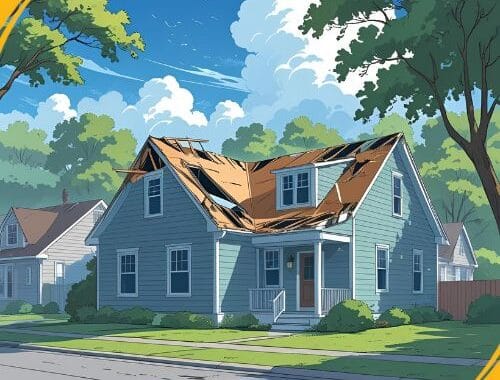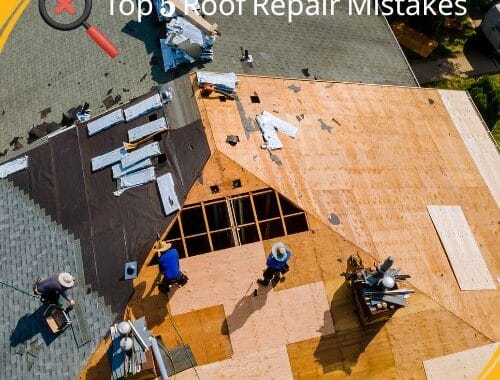Hiring the right roofing contractor is crucial for ensuring your home remains safe, secure, and well-protected from the elements. Whether you’re installing a new roof, repairing an old one, or just seeking maintenance, choosing a reliable, professional contractor is essential. Unfortunately, the roofing industry is not immune to scams, and homeowners must be cautious of certain red flags that signal a potential fraud. In this article, we will walk you through some of the most common warning signs to watch out for when hiring a roofing contractor, helping you avoid roofing scams and ensure your project is in good hands.
1. Lack of Proper Licensing and Insurance
One of the first red flags to look out for is a contractor who cannot provide proof of their licensing and insurance. A reputable roofing contractor will have the necessary state or local licenses, as well as insurance coverage to protect both themselves and their clients in case of accidents or property damage.
Why Is This Important? Without the proper licensing, a contractor may not be qualified to perform roofing work up to code. Additionally, lack of insurance puts you at risk for paying out-of-pocket for any damages that occur during the project. Make sure to verify a contractor’s credentials before signing any agreements.
2. Unusually Low or “Too Good to Be True” Prices
While it’s always tempting to choose the cheapest option, an unusually low price is often a major warning sign. Some unscrupulous contractors may offer a very low bid to attract customers, but they often cut corners with materials, labor, or safety precautions, leading to poor results and additional repair costs down the line.
How to Spot Fair Pricing Get at least three estimates from different contractors to compare prices and scope of work. If one bid is significantly lower than the others, it could indicate that the contractor is either using subpar materials or planning to upsell you on hidden costs later.

3. Lack of a Written Contract
A reputable contractor will always provide a written contract that outlines all the details of the job, including the timeline, the type of materials used, the total cost, and payment schedule. If a contractor insists on verbal agreements or refuses to provide a written contract, you should be very cautious. A contract not only protects you, but it also ensures that both parties are on the same page about the project’s expectations.
What Should Be Included in the Contract?
- A clear description of the work to be done
- The brand and type of materials being used
- The project’s start and completion dates
- Payment terms and schedule
A detailed contract ensures that both you and the contractor are held accountable, preventing misunderstandings and disputes later on.
4. Pressure to Make Quick Decisions
Another red flag is when a roofing contractor pressures you into making a decision quickly. Whether it’s offering a “limited-time discount” or warning you that the price will go up soon, any pressure to make a hasty decision should raise a red flag. A reliable contractor will give you the time you need to consider your options, compare estimates, and make an informed decision.
How to Handle This? If you feel rushed or uneasy, take a step back and reconsider the situation. A trustworthy contractor will be patient, answering all your questions without trying to rush you into making a commitment.
5. No References or Poor Reputation
A legitimate roofing contractor will have a solid reputation, and they should be able to provide references or testimonials from previous clients. If a contractor is unwilling to provide references or if they have poor reviews online, it’s a major red flag. A lack of a professional track record suggests that they may not have the necessary experience to handle your project.
How to Check Reviews and References?
- Ask for at least three references from recent clients.
- Look up online reviews on trusted websites like Google, Yelp, or Angie’s List.
- Speak with your neighbors or community members who have had similar work done.
6. No Physical Address or Website
A reputable roofing contractor will have a physical office address and a professional website. If a contractor only provides a P.O. box or a phone number, or if they don’t have a website, it could be a sign that they’re operating without a legitimate business infrastructure. A professional contractor invests in a legitimate business, which usually includes having a brick-and-mortar office and an online presence.
Why It Matters? Having a physical address and a website helps ensure the contractor is established and accountable. It’s also a useful resource for you to find information, reviews, and other important details about the contractor.
7. Asking for Full Payment Upfront
A reputable roofing contractor will typically ask for a deposit before work begins, but they should not request full payment upfront. Asking for all the money before starting the work is a classic scam tactic. A professional contractor will only request a portion of the payment initially, with the remainder due after the work is completed to your satisfaction.
What Is Considered Normal Payment Structure? Expect to pay a deposit of 10-30% upfront, with payments made in installments as the project progresses. Full payment should only be made once the job is complete and meets your expectations.
8. Use of Substandard Materials
Some roofing contractors may try to cut costs by using cheap, substandard materials. Although these materials might lower the initial price, they won’t last as long and could lead to more problems in the future. Always ask your contractor about the type of materials they will be using, and make sure they meet industry standards.
How to Verify Material Quality? Ask for details about the brand and type of materials used. A reputable contractor should be able to explain why they’ve chosen certain materials and how they will benefit your roof in the long run.
9. Unprofessional Behavior
Finally, unprofessional behavior is a major red flag. If a contractor is rude, unresponsive, or doesn’t arrive on time, it’s a clear sign that they might not take their work seriously. A good contractor should treat you with respect, respond to your queries in a timely manner, and show up when they say they will.
Signs of Unprofessionalism:
- Poor communication and delayed responses
- Disorganization or untidy appearance
- Lack of respect for your time or property
Conclusion
Choosing the right roofing contractor is a critical decision that requires careful consideration. By being aware of the red flags discussed in this article, you can protect yourself from falling victim to scams and ensure your roofing project is handled by a qualified, reputable professional. Always do your due diligence before hiring a contractor, and don’t hesitate to ask questions or request documentation. Your roof is too important to entrust to just anyone.




